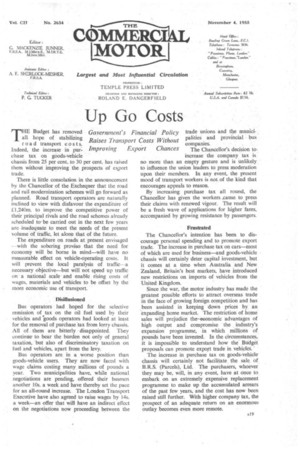Up Go Costs
Page 21

If you've noticed an error in this article please click here to report it so we can fix it.
THE Budget has removed all hope of stabilizing road transport Costs: Indeed, the increase in pur chase tax on goods-vehicle chassis from 25 per cent. to 30 per cent. them without improving the prospects trade.
There is little consolation in the announcement by the Chancellor of the Exchequer that the road and rail modernization schemes will go forward as planned. Road transport operators are naturally inclined to view with disfavour the expenditure of 1.1,240m. to improve the competitive power of their principal rivals and the road schemes already scheduled to-be carried out in the next few years are inadequate to meet the needs of the present volume of traffic, let alone that of the future.
The expenditure on roads at present envisaged —with the sobering proviso that the need for economy will be borne in mind—will have no measurable effect on vehicle-operating costs. It will prevent the local paralysis of traffic—a necessary objective—but will not speed up traffic on a national scale and enable rising costs of wages, materials and vehicles to be offset by the more economic use of transport.
Disillusioned Bus operators had hoped for the selective remission of tax on the oil fuel used by their vehicles and 'goods operators had looked at least for the removal of purchase tax from lorry chassis. All of them are bitterly disappointed. They continue to bear the burden not only of general taxation, but also of discriminatory taxation on fuel and vehicles, apart from the levy.
Bus operators are in a worse position than goods-vehicle users. They ire now faced with wage claims costing many millions of pounds a year. Two municipalities have, while national negotiations are pending, offered their busmen another 10s. a week and have thereby set the pace for an all-round increase. The London Transport Executive have also agreed to raise wages by 14s.
week---an offer that will have an indirect effect on the negotiations now proceeding between the Government's Financial Policy trade unions and the municiRaises Transport Costs Without palities and provincial bus Export Chances The Chancellor's decision to increase the company tax is no more than an empty gesture and is unlikely to influence the union leaders to press moderation upon their members. In any event, the present mood of transport workers is not of the kind that encourages appeals to reason.
By increasing purchase tax all round, the Chancellor has given the workers >cause to press their claims with renewed vigour. The result will be a fresh wave of applications for higher fares, accompanied by growing resistance by passengers.
Frustrated The Chancellor's intention has been to discourage personal spending and to promote export trade. The increase in purchase tax on cars—most of which are used for business—and goods-vehicle chassis will certainly deter capital investment, but it comes at a time when Australia .and New Zealand, Britain's best markets, have introduced new restrictions on imports of vehicles from the United Kingdom.
Since the war, the motor industry has made the greatest possible efforts to attract overseas trade in the face of growing foreign competition and has ,been assisted in keeping down prices by. an expanding home market. The restriction of home sales will prejudice the---eoonomic advantages of high output and compromise the industry's expansion programme, in which millions of pounds have been invested. In the circumstances, it is impossible to understand how the Budget proposals can promote export trade in vehicles.
The increase in purchase tax on goods-vehicle' Chassis will certainly not facilitate the sale of B.R.S. (Parcels), Ltd. The purchasers, whoever they may be, will, in any event, have at once to embark on an extremely expensive replacement programme to make up the accumulated arrears of the past few years, and the cost. has now been raised still further. With higher company tax, the prospect of an adequate return on an enormous outlay becomes even more remote.




















































































